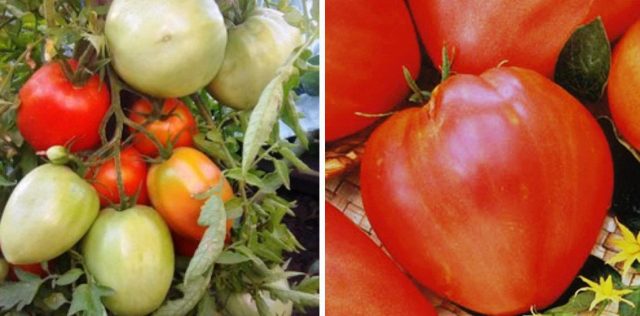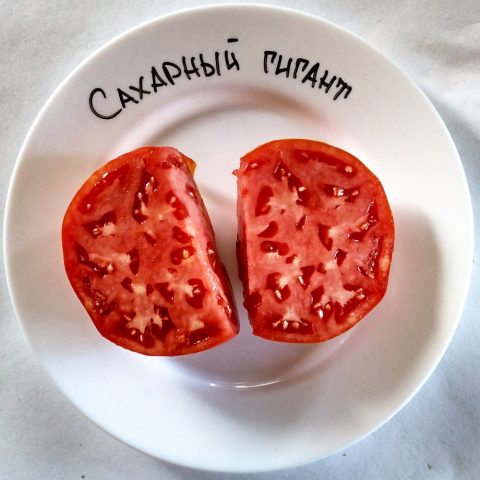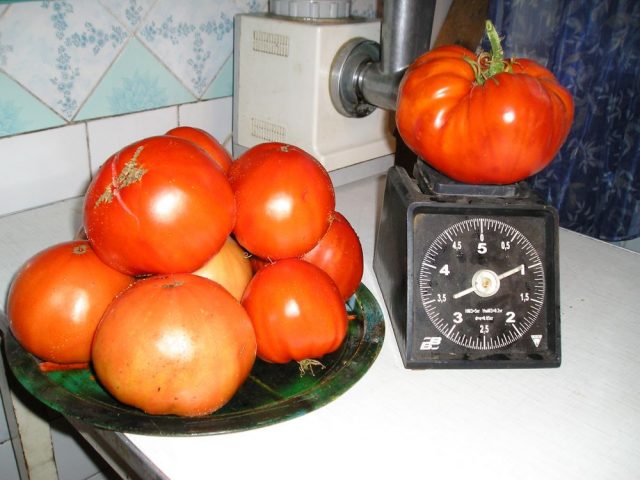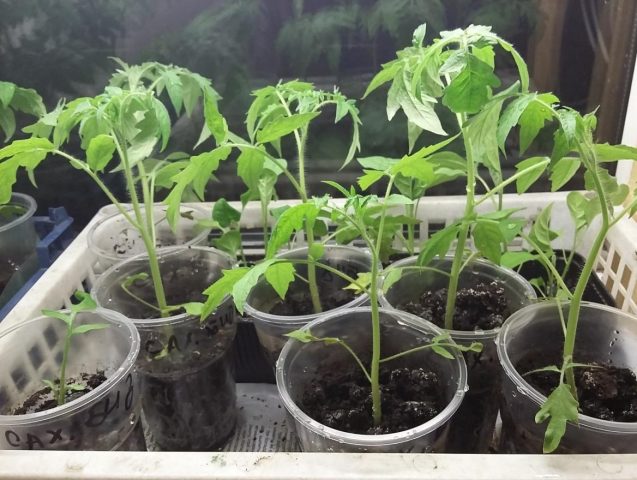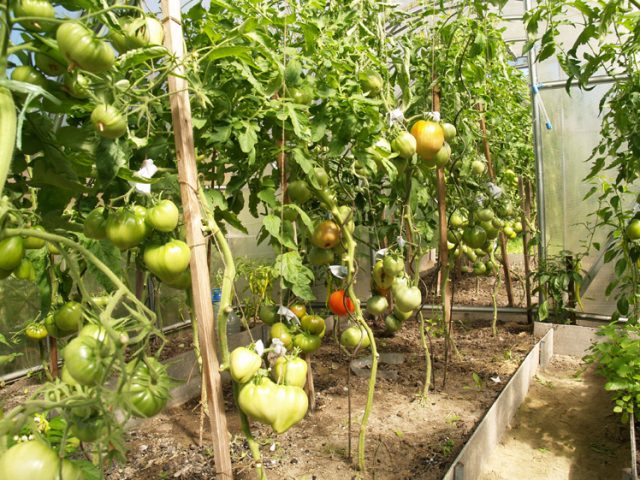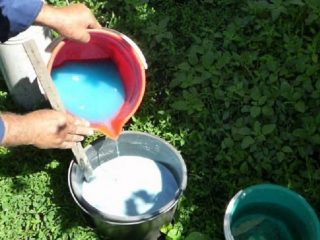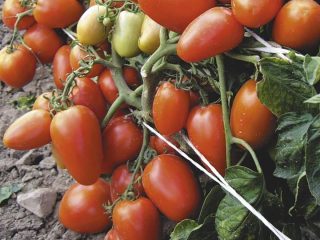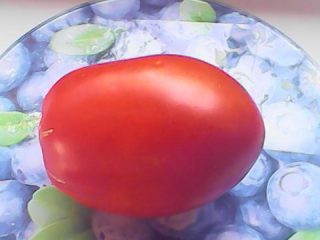Content
The sugar giant tomato is the result of amateur selection that appeared on the Russian market more than 10 years ago. The variety was not registered in the State Register, which creates difficulties in accurately determining its characteristics, but this does not prevent the culture from being in demand among lovers of large, sweet tomatoes. According to gardeners who have been cultivating tomatoes for more than one year, the Sugar Giant is undemanding to care for, is resistant to weather changes and perfectly sets fruits, regardless of the climate.
Description of the tomato variety Sugar giant
The description of the variety is based on the reviews of amateur vegetable growers, since there is no such tomato in the register of plants in Russia, Belarus and Ukraine. However, Sugar Giant seeds are offered by several seed companies. Description, photos and characteristics of the variety from different manufacturers may differ slightly.
In various sources, the tomato is described as a vegetable of a cuboid, oblong or spherical-flattened shape. Experienced amateur agronomists claim that the characteristic shape of the fruit of this variety is round, slightly pointed and elongated to the tip (heart).
The rest of the description of the sugar giant tomato has no discrepancies. The tomato bush develops in an indeterminate manner, without stopping the growth of the central stem. In the open field, the culture is capable of reaching 2 meters in height, in a greenhouse - 1.5 m.
Tomato shoots are thin but strong. Average leafiness. The growth of lateral shoots is moderate. The drooping leaves of a dark green color provide the bushes with good ventilation and illumination.
The first flower raceme appears above the 9th leaf, then regularly through 2 internodes. The ovaries are abundantly formed until the very frost. Each bunch lays up to 6 fruits.
The fruiting period of the Sugar Giant is extended and is limited only by the onset of frost. Tomatoes are mid-late, the first ripe fruits are obtained 120-125 days after germination. The warmer the growing region, the earlier the first tomatoes ripen. In the open ground of the south of Russia, the harvest begins in 100-110 days.
The tall, thin stem bears many weighty fruits. Therefore, the garter procedure is mandatory at all stages of cultivation. Especially large tomato clusters need separate support.
Brief description and taste of fruits
Heart-shaped, large tomatoes of the Sugar Giant variety, when unripe, have a pale green color with a dark spot around the stalk. When ripe, tomatoes acquire a uniform red, classic color. The pulp is completely colored in the same tone, does not have a hard core.
Varietal characteristics of tomatoes Sugar giant:
- the pulp is dense, juicy: dry matter no more than 5%;
- the skin is thin, which is why transportability is low;
- the content of sugars and lycopene (carotenoid pigment) is above average for tomatoes;
- average fruit weight - 300 g, maximum - 800 g (achieved in open beds).
Cracking of ripe tomatoes occurs most often in open ground, with waterlogging during the ripening of tomatoes.Greenhouse and greenhouse fruits of the Sweet Giant are not prone to peel breakage.
High taste, juiciness of the pulp allow you to process tomatoes for the preparation of juice, sauces. Whole fruit preservation is impossible due to the large size of ripe fruits. Tomatoes are mainly used fresh and for salads.
The taste characteristics of the Sugar Giant are rated as excellent. Reduced aroma and sugar content only in a cloudy, rainy season. Such factors do not affect the size of tomatoes and the overall yield.
Varietal characteristics
The characteristics of the Sugar Giant tomato and the description of the variety are constantly being updated according to the reviews of amateur vegetable growers from all over the country. The timing of fruiting varies significantly from region to region and depends on climatic conditions. In greenhouses, the sugar giant's fruit-bearing period is particularly extended and can exceed 2 months.
The total yield of a variety is highly dependent on the method of formation. When led in two stems, the tops of the shoots are pinched, leaving 2 leaves above the bunch, at a height of 1.5 m. In greenhouses, a Sugar Giant is formed in one sleeve, leaving one stepson to replace and prolong fruiting.
From one bush under the most unfavorable conditions, you can get at least 4 kg of tomatoes. Correct agricultural technology increases the yield up to 6-7 kg. When planted with a density of 3 plants per 1 sq. m you can expect a total yield of fruits up to 18 kg.
The immunity of the Sugar Giant to disease has not been reliably confirmed. Under different growing conditions and climates, tomatoes react differently to infections.
General information on the resistance of the Sugar Giant to typical tomato diseases:
- Late ripening dates coincide with the period of phytophthora activity. It is recommended to carry out preventive spraying with Bordeaux mixture or other copper-containing preparations.
- The variety shows relative resistance to fungi. For the prevention of disease, planting should not be overly moisturized Most often, infection occurs in high humidity and cold soil.
- For the prevention of apical rot, calcium is introduced into the soil (in the form of ground chalk, slaked lime).
- The resistance of the Sugar Giant to the causative agent of tobacco mosaic, Alternaria, is noted.
Fruit cracking during ripening is not a distinguishing feature of the variety. This phenomenon is observed in large varieties with thin skin with unbalanced watering. To prevent cracking, the soil is enriched with nitrate and watering is reduced during fruiting.
Sugar giant tomato bushes are just as susceptible to insect damage as all nightshade plants. If pests are found, the plantings will have to be treated with a specially selected insecticide or a complex preparation.
Pros and cons of the variety
Experienced gardeners, sharing their experience in growing the Sugar Giant, note the following advantages of the variety:
- Sweet pulp, strong tomato fruit aroma.
- The ability to get ripe tomatoes for a long time.
- Drooping foliage that does not block the fruits from the sun.
- The ability to reproduce with your own seeds.
- Undemanding varieties for watering.
Negative reviews are most often associated with the discrepancy between the grown fruits and the declared variety. Various manufacturers place photographs of tomatoes that differ greatly from each other in shape and even color on the seed packages of the Sugar Giant. It is better to purchase planting material in private nurseries with a proven reputation.
The relative disadvantage of tomato is called the thinness of the stems, which require good support. It is necessary to monitor the secure attachment of the bush and the support of the bunches throughout the growing season.
Planting and care rules
In unprotected ground, the sugar giant will show its full potential only in the south of the country. In more temperate climates, most of the crop may not reach full ripeness.
In the middle lane, tomato bushes are lower, the fruits are smaller, but with sufficient illumination, the taste of tomatoes does not suffer from this. In such regions, the variety is grown under film shelters. In cold climates, it is possible to obtain good yields of the Sugar Giant only in greenhouses.
Growing seedlings
Sowing dates of the Sugar Giant variety for seedlings are calculated so that young plants are ready to be taken to a permanent place after 70 days. When sown in March, transplanting seedlings will be possible from mid-May. If determinant tomatoes can be grown in rows in one large container, then for a tall tomato it is imperative to prepare separate glasses for transplanting after a pick.
The variety has no special requirements for the composition and nutritional value of the soil; it is important that the soil is loose and breathable. It is quite enough ready-made store soil mixture for nightshades. Self-composed mixtures of peat, garden soil and sand must be disinfected before planting, for example, by heating in the oven.
The self-collected planting material requires disinfection in a solution of potassium permanganate, Epine or Fitosporin. The seeds are kept in solution for at least 0.5 hour, and then dried until flowable.
Stages of growing seedlings of the Sugar Giant:
- The soil mixture is laid out in containers and the seeds are immersed in it to a depth of no more than 1.5 cm, retreating about 2 cm each time.
- The soil is sprayed with a spray bottle for uniform, moderate moisture.
- Cover containers with glass or polyethylene for a greenhouse effect.
- Contain plantings at a temperature of about + 25 ° C until shoots appear.
- They remove the shelter and grow the seedlings in the light.
To prevent the appearance of a black leg, after each watering, the sprouts can be pollinated with ash. Moistening is done not earlier than the soil dries out to a depth of 1 cm.
After the appearance of two true leaves, the Sugar Giant tomatoes should dive. The plant is carefully removed from the ground and the root is shortened by 1/3. At this point, you can transplant the plants one at a time into deep glasses with a capacity of at least 300 ml. A pick will force the tap root system to develop in breadth.
To prevent the seedlings from stretching too much, it should be provided with good lighting. The best temperature for the development of tomatoes is between 16 and 18 ° C.
Transplanting seedlings
Transplanting young Sugar Giant bushes into open ground or a greenhouse is carried out after the soil warms up to + 10 ° C in the absence of night frosts. Usually, for the middle lane, this is the period from mid-May to early June.
Before starting work, you should prepare both the soil and tomato sprouts:
- the soil in the garden is cleared of weeds, dig up and fertilize with humus, lime if necessary;
- planting holes are prepared in size slightly larger than glasses, disinfect them with a solution of potassium permanganate, add a little humus, peat, wood ash;
- at least 20 days before transplanting, watering is reduced, and after 7 days, moisture is completely stopped, so it will be easier to move the seedlings without damage and the plants will start to grow rapidly in a new place;
- young tomatoes begin to be taken out into the open air 10-14 days before transplanting for hardening;
- Seedlings of the Sugar Giant are ready for planting at the age of 60 days, with a growth of more than 20 cm, with 6 true leaves.
The planting scheme involves leaving 60 cm between the bushes of the Sugar Giant.Usually tomatoes of this variety are placed in two lines with an indent of 50 cm. About 80 cm are measured between the rows. As a result, there should be no more than 3 tomatoes per square meter.
When planting, the seedlings of the Sugar Giant are buried to the first leaves. If the bushes are overgrown or elongated, the stem is immersed even deeper or placed obliquely in the hole.
Planting care
Tomato variety Sugar giant tolerates soil drying well. Excessive moisture is much more dangerous for him. For the normal development of tomatoes, watering is enough once a week, but at least 10 liters under one bush. Reduce irrigation before flowering and before the final ripening of the next bunch.
Sugar giant tomatoes are responsive to feeding. You can fertilize plantings every 2 weeks: first with diluted manure, and after flowering - with potassium salt and superphosphate.
In the open ground of warm areas, it is permissible to form a Sugar Giant bush into 2 or 3 stems. All lateral processes and stepchildren should be removed regularly. Greenhouse and greenhouse tomatoes are best managed with one stem.
Conclusion
Tomato Sugar giant, being a "folk" variety, is very popular among summer residents, due to its undemanding watering. Leaving every few weeks is enough to get a decent harvest. The variety develops well in a greenhouse, greenhouse or in an open garden and is able to delight with sweet, large tomatoes until the very frost.
